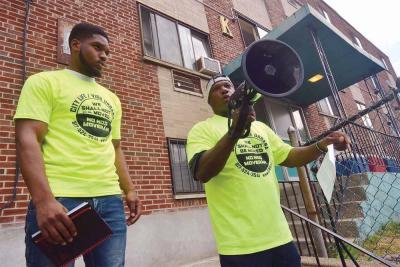August 6, 2015
 Steven Julien-Stewart, left, and Anthony Dabney, right, who lives in an apartment at 200 Hancock St. with his 11 year-old son, spoke out at a rally last Saturday. Tenants are upset that the owner has raised rents without making improvements to the building, which they claim is in poor condition. Chris Lovett photo
Steven Julien-Stewart, left, and Anthony Dabney, right, who lives in an apartment at 200 Hancock St. with his 11 year-old son, spoke out at a rally last Saturday. Tenants are upset that the owner has raised rents without making improvements to the building, which they claim is in poor condition. Chris Lovett photo
A few months ago, Anthony Dabney was walking his 11-year-old son out of their 200 Hancock St. apartment building in Dorchester when he ran into a group of people smoking crack in the entranceway. As the group scurried away, Dabney quickly kicked the crack pipe, still lit, out of sight from his son.
Dabney and others living in his 37-unit building say this sort of open drug use and other issues like broken windows, rodents, and mold, have been largely ignored since a corporate property manager took over the premises in 2013.
But residents have had enough: Last Saturday, more than 40 tenants and community organizers gathered outside 200 Hancock to voice complaints about its unsafe and unsanitary conditions and to speak out against what they see as unfair rent increases from the manager, Ron Ifrah of Brookline’s Longwood Residential.
“I want Ron to take notice and treat us like humans,” Dabney called out to the crowd over chants of “stand up, fight back” and supportive cheers from neighbors and passing cars.
City Councillor-at-large Ayanna Pressley attended the rally and took a tour of 200 Hancock, during which Dabney pointed out a haphazardly patched leak in his bathroom and the spots where he suspects mold is growing in his kitchen.
“Housing is about so much more than having a roof over your head,” Pressley said to the crowd. “This is simply unjust.”
The rally was organized in partnership with City Life/Vida Urbana, a Boston organization that helps those facing eviction to stay in their homes. Cynthia Peters, a volunteer organizer at City Life, said when she first canvassed the building in February, the conditions were deplorable.
“When we were walking in the basement, the carpet was soaked – every step was like walking through slush. The smell of mold was overpowering,” she said. One tenant saw human feces in the hallway, she said, and others complained that homeless people were having sex in the common areas.
In response, City Life helped form a tenants’ association at 200 Hancock in March that soon after sought help in dealing with the unsafe conditions from city officials and the Inspectional Services Department (ISD). The association sent letters to City Councillor Frank Baker, Peters said, who followed up with ISD, which in turn called on Ifrah to bring the building up to code.
“We basically read him the riot act,” said John Meaney, assistant commissioner of inspectional services at ISD. Meaney said that when he was invited to the building in April, it was completely neglected and close to becoming a “problem property.”
When contacted by the Reporter, Ifrah said the problems in the building stemmed not from poor management, but from just a few bad tenants who were wreaking havoc on the property and who have since been evicted.
“We complied 100 percent with all ISD requests, and moving forward, we’ll try to get a better place for the tenants to live,” he said. Since April, Ifrah said he has stepped up cleaning services, replaced the dumpster, and put a new lock on the door.
For his part, Meaney said Ifrah has done little more than comply with the law. “Before we got involved, he was doing virtually nothing. What he’s doing now is what he should have been doing all along.”
Now, tenants say Ifrah has raised the rent at 200 Hancock, for some up to $200 more each month. They say this is uncalled for given the conditions of the building. In response, the tenants’ association said it’s willing to negotiate a more progressive rent increase that doesn’t overburden tenants all at once and has drafted a collective contract for Ifrah to sign. Peters said the contract includes a provision for a 3 percent rent increase per year for five years, a request that Ifrah respond to complaints in a timely manner, and a cap on rent for Section 8 tenants, meaning their rent can’t exceed the maximum that Section 8 will pay for them.
At least 16 tenants in the building have signed a letter saying they won’t pay Ifrah’s proposed rent increase, which means they may face eviction if he isn’t willing to negotiate, Peters said.
Indeed, Ifrah told the Reporter that anyone who doesn’t pay the rent increase “will have to go,” and that he won’t consider the tenants’ association’s proposed contract.
“I’m willing to talk to any tenant; my door is always open,” Ifrah said. “But I won’t sign collectively with any tenant association, any agreement.”
The manager’s stance poses a problem for the tenants, who have struggled in the past to work with him. Many have never met him, and others feel ignored by him, Peters said. And when asked by the Reporter, Ifrah acknowledged that he doesn’t actually know how many people live at 200 Hancock.
For Anthony Dabney, the increase would mean he’d pay $100 more each month— a total of $1200— for an apartment with leaky windows and moldy ceilings. He said he won’t pay it, and he hopes the rally will pressure Ifrah to make safety in the building a priority. As a single dad, he said he just wants a secure home for his son.
“Home is all about what’s inside the house, not outside,” he said. “I just want him to feel safe.”
Topics:


